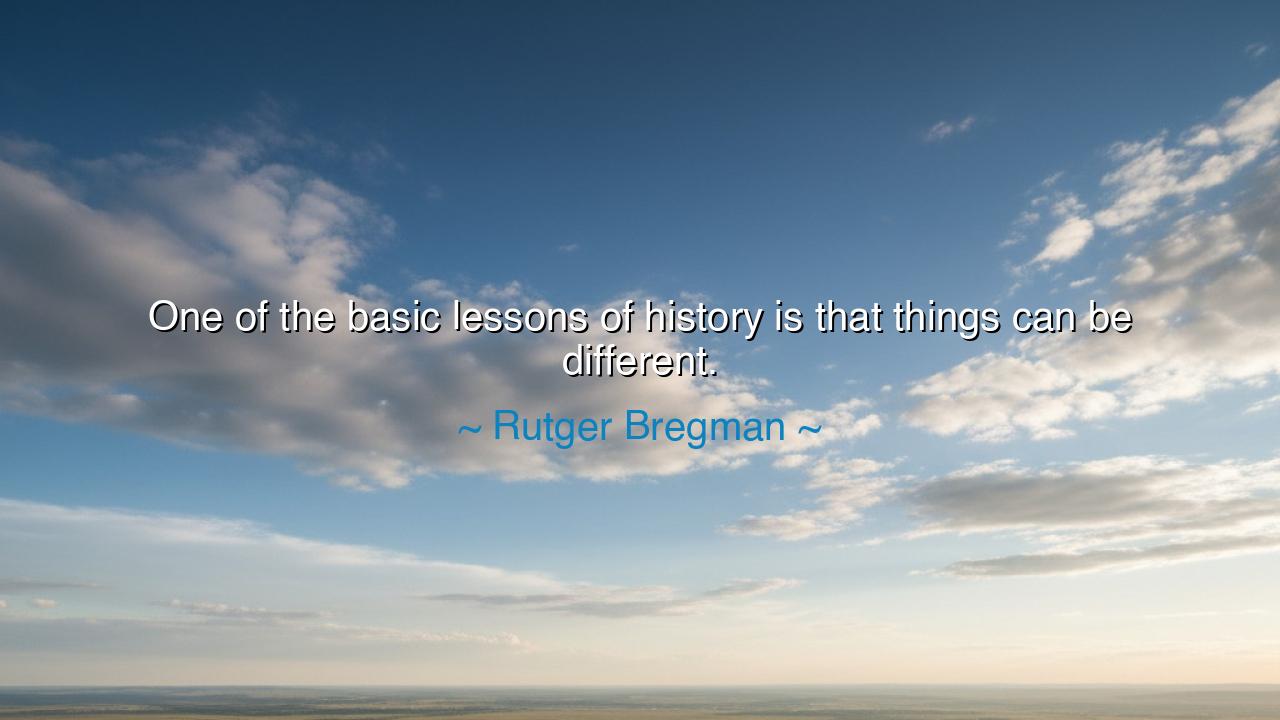
One of the basic lessons of history is that things can be






“One of the basic lessons of history is that things can be different.” — Rutger Bregman
Hear these words, O listeners, and inscribe them upon your hearts, for they are not the musings of a dreamer but the revelation of one who has studied the rise and fall of humankind. Rutger Bregman, the Dutch historian and thinker, speaks to us not of despair but of possibility — that sacred flame which refuses to be extinguished, even in the darkest chapters of history. When he says that “things can be different,” he does not whisper comfort; he declares a truth proven by the very fabric of time. For history itself is the testimony of change — of kings dethroned, of chains broken, of worlds reborn through the will of those who refused to believe that what is must forever be.
Bregman, whose work seeks to reawaken hope in an age of cynicism, wrote these words as a challenge to fatalism — that heavy belief that society, greed, and cruelty are eternal and unchangeable. He reminds us that every age that called itself unmovable has eventually moved. Every empire that claimed immortality has fallen. Every injustice once seen as natural has been overturned by those who dared to imagine another way. This is the basic lesson of history, the quiet but unyielding truth: that the present is not destiny, and the patterns of the past do not chain the future.
Consider the tale of the abolition of slavery, once thought an impossible dream. For thousands of years, men believed it the natural order — that some were born to rule and others to serve. Philosophers justified it; empires depended upon it. Yet in the eighteenth and nineteenth centuries, through the courage of those who saw humanity where others saw property, the unthinkable became reality. The British abolitionists, the freedmen of Haiti, the voices of Frederick Douglass and Sojourner Truth — all proved that the world could change, that the human conscience could awaken. What had seemed eternal crumbled within a generation. So, too, every age has its own chains to break, and its own unbelief to conquer.
When Bregman reminds us that things can be different, he also warns us of a danger — the forgetting of this truth. For when people forget that history changes, they surrender to stagnation. They accept the injustices of their own time as inevitable, just as those before them did. But to study history rightly is to see not only its tragedies but its transformations — to recognize that despair has never been the final word. The plagues have passed, the wars have ended, the tyrants have fallen, and from every ruin, humanity has rebuilt. To learn history, then, is to learn hope.
The ancients, too, understood this lesson in their own way. The philosopher Heraclitus taught that all things flow, that the river of existence is never the same from one moment to the next. And yet, each generation must rediscover this truth for itself. When men and women lose faith in change, they cease to act; when they cease to act, the world grows dim. But when one person remembers — when one voice dares to speak against the supposed permanence of suffering — the tide begins to turn. Thus, history is not only the record of what has changed, but the seedbed of what can change again.
From this wisdom flows a command to the present: do not bow before despair. When you see the world mired in injustice, when greed and cruelty seem to reign unchallenged, remember the rhythm of time. The tyrant is loud today but silent tomorrow. The impossible of one century becomes the ordinary of the next. What we accept as immutable is often but the habit of thought. Challenge it. Question it. Dream beyond it. For it is through imagination — the belief that “things can be different” — that every age has been transformed.
So let this be your guiding star: History is the proof of possibility. To study it is not to look backward, but to learn how to move forward. Bregman’s words are a call to awaken the creative courage within each soul, the belief that we are not prisoners of what has been, but participants in what will be. As long as there are those who dare to think differently, humanity’s story remains unfinished. Remember this, and you will never be powerless — for to know that change is possible is to hold the key to shaping it.






AAdministratorAdministrator
Welcome, honored guests. Please leave a comment, we will respond soon